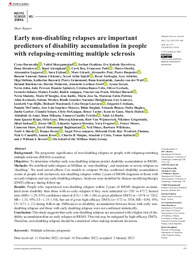Título :
Early non-disabling relapses are important predictors of disability accumulation in people with relapsing-remitting multiple sclerosis |
Autor :
Daruwalla, Cyrus 
Sahygannejad, Vahid
Ozakbas, Serkan 
Kubala Havrdova, Eva 
Horakova, Dana 
Alroughani, Raed 
Cavit Boz, Francesco Patti
Onofrj, Marco
Lugaresi, Alesssandra
Eichau, Sara
Girard, Marc
Prat, Alexandre 
Duquette, Pierre
Yamout, Bassem 
Khoury, Samia J |
Editor :
Sage Journals |
Departamento:
Departamentos de la UMH::Medicina Clínica |
Fecha de publicación:
2023-06 |
URI :
https://hdl.handle.net/11000/37414 |
Resumen :
Background: The prognostic significance of non-disabling relapses in people with relapsing-remitting
multiple sclerosis (RRMS) is unclear.
Objective: To determine whether early non-disabling relapses predict disability accumulation in RRMS.
Methods: We redefined mild relapses in MSBase as ‘non-disabling’, and moderate or severe relapses as
‘disabling’. We used mixed-effects Cox models to compare 90-day confirmed disability accumulation
events in people with exclusively non-disabling relapses within 2years of RRMS diagnosis to those with
no early relapses; and any early disabling relapses. Analyses were stratified by disease-modifying therapy
(DMT) efficacy during follow-up.
Results: People who experienced non-disabling relapses within 2 years of RRMS diagnosis accumulated more disability than those with no early relapses if they were untreated (n=285 vs 4717; hazard
ratio (HR)=1.29, 95% confidence interval (CI)=1.00–1.68) or given platform DMTs (n=1074 vs 7262;
HR=1.33, 95% CI=1.15–1.54), but not if given high-efficacy DMTs (n=572 vs 3534; HR=0.90, 95%
CI=0.71–1.13) during follow-up. Differences in disability accumulation between those with early nondisabling relapses and those with early disabling relapses were not confirmed statistically.
Conclusion: This study suggests that early non-disabling relapses are associated with a higher risk of disability accumulation than no early relapses in RRMS. This risk may be mitigated by high-efficacy DMTs.
Therefore, non-disabling relapses should be considered when making treatment decisions.
|
Palabras clave/Materias:
multiple sclerosis
prognosis |
Tipo de documento :
info:eu-repo/semantics/article |
Derechos de acceso:
info:eu-repo/semantics/openAccess |
DOI :
10.1177/13524585231151951 |
Publicado en:
Mult Scler . 2023 Jun;29(7):875-883 |
Aparece en las colecciones:
Artículos Medicina Clínica
|
 La licencia se describe como: Atribución-NonComercial-NoDerivada 4.0 Internacional.
La licencia se describe como: Atribución-NonComercial-NoDerivada 4.0 Internacional.
.png)
